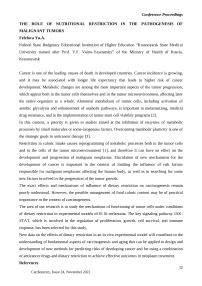The role of nutritional restriction in the pathogenesis of malignant tumors
Бесплатный доступ
Cancer is one of the leading causes of death in developed countries. Cancer incidence is growing, and it may be associated with longer life expectancy that leads to higher risk of cancer development. Metabolic changes are among the most important aspects of the tumor progression, which appear both in the tumor cells themselves and in the tumor microenvironment, affecting later the entire organism as a whole. Abnormal metabolism of tumor cells, including activation of aerobic glycolysis and enhancement of anabolic pathways, is important in metastasizing, medical drug resistance, and in the implementation of tumor stem cell viability programs [2]. In this context, a priority is given to studies aimed at the inhibition of enzymes of metabolic processes by small molecules or some exogenous factors. Overcoming metabolic plasticity is one of the strategic goals in anticancer therapy [3].
Короткий адрес: https://sciup.org/148326297
IDR: 148326297 | DOI: 10.18137/cardiometry.2022.24.conf.5
Текст статьи The role of nutritional restriction in the pathogenesis of malignant tumors
Federal State Budgetary Educational Institution of Higher Education “Krasnoyarsk State Medical University named after Prof. V.F. Voino-Yasenetsky” of the Ministry of Health of Russia, Krasnoyarsk
Cancer is one of the leading causes of death in developed countries. Cancer incidence is growing, and it may be associated with longer life expectancy that leads to higher risk of cancer development. Metabolic changes are among the most important aspects of the tumor progression, which appear both in the tumor cells themselves and in the tumor microenvironment, affecting later the entire organism as a whole. Abnormal metabolism of tumor cells, including activation of aerobic glycolysis and enhancement of anabolic pathways, is important in metastasizing, medical drug resistance, and in the implementation of tumor stem cell viability programs [2].
In this context, a priority is given to studies aimed at the inhibition of enzymes of metabolic processes by small molecules or some exogenous factors. Overcoming metabolic plasticity is one of the strategic goals in anticancer therapy [3].
Restriction in caloric intake causes reprogramming of metabolic processes both in the tumor cells and in the cells of the tumor microenvironment [1], and therefore it can have an effect on the development and progression of malignant neoplasms. Elucidation of new mechanisms for the development of cancer is important in the context of limiting the influence of risk factors responsible for malignant neoplasms affecting the human body, as well as in searching for some new factors involved in the progression of the tumor growth.
The exact effects and mechanisms of influence of dietary restriction on carcinogenesis remain poorly understood. However, the possible management of food caloric content may be of practical importance in the context of carcinogenesis.
The area of our research is to study the mechanisms of functioning of tumor cells under conditions of dietary restriction in experimental models of B-16 melanoma. The key signaling pathway JAK-STAT, which is involved in the regulation of proliferation, growth, cell survival, and immune response, has been selected for this study.
New data on the effects of dietary restriction in an in vivo experimental model will contribute to the understanding of fundamental aspects of carcinogenesis and aging that can be applied to design and development of new methods for predicting risks of developing cancer and for using a combination of anticancer drugs and dietary restriction to achieve effective outcomes in neoplasm treatment.
Список литературы The role of nutritional restriction in the pathogenesis of malignant tumors
- Alyssa J. Cozzo, Michael F. Coleman, Jane B. Pearce, Alexander J. Pfeil, Suhas K. Etigunta, Stephen D. Hursting. Dietary energy modulation and autophagy: exploiting metabolic vulnerabilities to starve cancer. Front Cell Dev Biol. 2020. Nov 5;8:590192.
- Matthew G. Vander Heiden, Ralph J. DeBerardinis. Understanding the intersections between metabolism and cancer Biology. Cell. 2017.168 (4); p. 657-669.
- Jae Hyung Park, Woo Yang Pyun, Hyun Woo Park. Cancer metabolism: phenotype, signaling and therapeutic targets. Cells. 2020; 9 (10); p. 2308.


